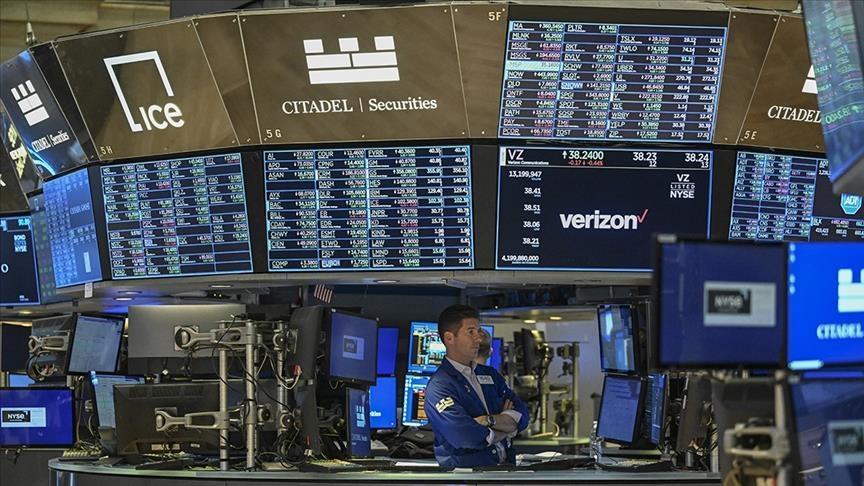Africa-Press – Eritrea. Global markets started the new week on Monday with selling pressure after US President Donald Trump’s promised tariffs went into effect on Tuesday, imposing additional customs duties of 25% on Canada and Mexico, and 10% on China.
Canadian Prime Minister Justin Trudeau imposed retaliatory tariffs against the US, saying at a recent press conference that a 25% tariff will be imposed on imports worth $105.5 billion, $20.4 billion of which will be tariffed starting on Tuesday and the rest $85 billion in 21 days.
Meanwhile, the Chinese Commerce Ministry said it will take measures against Trump’s decision and it will file a complaint to the World Trade Organization due to violating its rules.
Trump also said he would impose tariffs on the EU. An EU Commission spokesperson said the bloc would “respond firmly to any trading partner that unfairly or arbitrarily imposes tariffs on EU goods — there is a lot at stake.”
Analysts noted that Trump’s tariff decisions and the retaliatory responses triggered a trade war and the market direction will be influenced by potential trade sanctions.
Fed officials said to be cautious in the face of Trump’s tariffs, as concerns that these may support inflationary pressures came to the fore. Officials suggested a gradual approach to monetary policy while assessing the Trump administration’s policies and their impacts.
Meanwhile, the US personal consumption expenditures (PCE) increased 0.7% on a monthly basis to $133.6 billion, above estimates, and the core PCE price index — the inflation indicator — excluding food and energy, climbed 0.2% month-on-month and 2.8% on an annual basis in December, according to the latest data.
Analysts say that the monthly increase in the core PCE is within estimates but the annual increase came as the fastest since April 2024, still above the Fed’s inflation target.
The Employment Cost Index increased 0.9% in the fourth quarter of 2024, in line with estimates.
As for corporate, energy firm Chevron’s shares fell 4.5% after it published a balance sheet on Friday with results below expectations, while Exxon Mobil shares declined 2.5% despite announcing better-than-expected profits.
The recently imposed tariffs also affected the American auto sector and cryptocurrencies. Ford Motor’s shares fell close to 1%, while Bitcoin started the week with a 4% decline to $93,927 and Ethereum with a 15% decrease to $2,510.
The US 10-Year Futures bond started Monday at 4.55, while the US Dollar Index climbed 1.1% to 109.7.
Meanwhile, the ounce price of gold fell 0.7% to $2,798 on Monday after breaking a record at $2,817 on Friday, while the barrel price of Brent crude oil declined 0.3% to $76.1.
The S&P 500 lost 0.5%, the Nasdaq 0.28%, and the Dow Jones 0.75% on the New York Stock Exchange on Friday, starting the new week on a negative course.
As for Europe, a buying-heavy course was prominent. Klaas Knot, the president of the Dutch Bank DNB, said on Sunday that the best economic response to tariffs is to do nothing, though he expects countries to retaliate regardless.
The eurozone’s inflation and Purchasing Managers’ Index (PMI) will be monitored on Monday as the region’s dilemma between inflation and recession continues.
Germany’s annual inflation rate unexpectedly weakened, falling 2.3% in January, while the EU’s Harmonized Index of Consumer Prices fell 0.2% on a monthly basis but rose 2.8% year-on-year, according to data released on Friday.
Eurozone consumers expect inflation to be 2.1% this year, upwardly revised by 0.2%, while they estimate the inflation to be unchanged at 1.9% in 2026 and 2% in 2027, according to the latest data.
On Friday, the DAX 40 rose 0.02% and the FTSE 100 0.31%, reaching new records near the close, while the FTSE MIB 30 climbed 0.12% and the CAC 40 0.11%. European index futures started Monday on a mixed course.
As for Asia, a negative course came to the fore on Monday, as selling pressure was prominent due to the US’ 10% additional tariffs on Chinese goods.
Chinese markets will open on Tuesday due to the Chinese New Year.
Meanwhile, Japan’s industry MPI was recorded at 48.7 and China’s Caixin manufacturing PMI came in at 50.1 for January, below expectations, according to data released on Monday.
The Nikkei 225 fell 3%, the Kospi index 2.8%, and the Hang Seng index 1.1%.
In Türkiye, the BIST 100 fell 0.77%, completing Friday at 10,004.38 points. All eyes turn to the inflation data for January, which is to be announced on Monday.
Analysts say that the levels of 10,000 and 9,900 are support for the BIST 100, while the 10,200 and 10,250 levels are resistance.
Economists participating in an Anadolu survey estimate Türkiye’s consumer price index to rise 4.29% in January.
Fitch Ratings affirmed Türkiye’s rating at BB- on Friday with a “stable” outlook. It said that the Turkish Central Bank started its easing cycle with two consecutive cuts of 250 basis points since December 2024, reducing the policy rate to 45%.
Fitch expects the policy rate to be reduced to 28% by the end of the year.
The US dollar/Turkish lira exchange rate climbed 0.2%, closing Friday at 35.8469, and it increased 0.2% at the opening on Monday.
For More News And Analysis About Eritrea Follow Africa-Press







